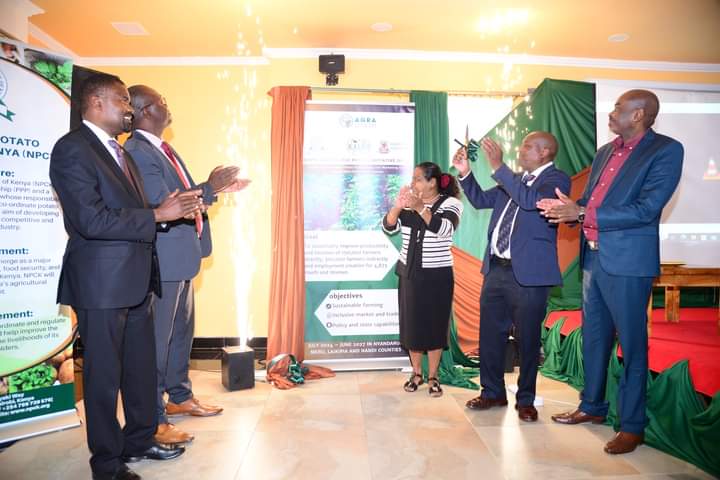
An Initiative To Support Potato Value Chain In Kenya Unveiled
The project will be implemented by The National Potato Council of Kenya (NPCK) alongside KALRO, Egerton University, Viazi Kings
In a move to increase potato productivity in Kenya, AGRA in collaboration with the National Potato Council of Kenya (NPCK), Egerton University, Kenya Agricultural and Livestock Research Organization (KALRO), and County Governments of Nyandarua, have unveiled a program dubbed Kenya Sustainable Potato Initiative (KSPI).
The project aims to transform the potato subsector in Nyandarua, Meru, Laikipia, and Nandi Counties. The initiative seeks to catalyze improved potato productivity and marketing to foster a sustainable potato food system across the project counties.
The project which will be carried out through various interventions across the potato value chain, seeks to increase productivity and incomes of 150,000 farmers directly (40% women and 10% youth) and increase competitiveness of the industry through improved value addition, marketing and policy environment. The project will also create over 4,800 employment opportunities for young people in primary production, input sourcing, marketing of potatoes, service provision, seed multiplication
The KSPI project will be implemented across Nyandarua, Meru, Laikipia and Nandi Counties for a period of three years starting July 2024 to June 2027.
The project will be implemented by The National Potato Council of Kenya (NPCK) alongside Kenya Agricultural and Livestock Research Organisation (KALRO), Egerton University, Viazi Kings and SimpleFine.
The project also seeks to build inclusive and structured input and output markets, access to financial services and trade opportunities for smallholder potato farmers and improve enabling environment and coordination in potato sub-sector for inclusive agriculture transformation.
This project, funded by the Gates Foundation through AGRA will fulfill a very important niche for food security for Kenya and has the potential to significantly improve integration of small-scale farmers into the seed potato and ware potato value chains.
John Macharia, AGRA Kenya Country Director, during the launch of the Kenya Sustainable Potato Initiative remarked, “We are trying to help the private sector build stronger market systems. We are focusing on cooperatives not just as an end to itself, but cooperatives too that will result in value addition, access to markets and processing. The cooperatives need to be able to grow into commercial enterprises, that engage in commercial relationships, that then ensure farmers are getting a bigger stake in the value chain.”
Also speaking on extension services John Macharia noted that, “We are also looking to strengthen extension services through this program. We are working with county governments on policy and state capabilities to ensure that extension is working. AGRA will be utilizing its VBA model (Village Based Advisors) and to support with the extension”
In Kenya, potato is both a staple food and a cash crop for many rural families and ranks as the second most important food crop after maize. It has grown by over 800,000 households, employs 2.7 million actors along the marketing channels, and contributes over KES 50 billion (~US$ 324M) to the economy. Potato is emerging as one of the strategic enterprises with the potential to play a great role in the realization of the set objectives of Vision 2030.
Despite the expanded production area, productivity per unit area has remained low (7-10T/ha) due to poor agronomic practices coupled with low access and use of poor-quality seeds, plus the use of unsuitable inputs. An analysis done by TechnoServe in 2019 shows that after a period of steady growth between the years 2000 and 2010, productivity has stalled. As a result, Kenya struggles to compete with regional potato producers, particularly Egypt and South Africa.
Prof John Ndiritu, Chair of the National Potato Council of Kenya stated that “Seeds for potatoes are the biggest bottlenecks for farmers. This project and its consortia members are looking to increase seed production from the current 900 metric tonnes to triple that amount in 3 years.” We are also looking to increase more potato varieties and certification schemes for farmers to enable them meet demand from franchises that require traceable and standardized produces.”
The project aims to increase seed potato production of demanded varieties by 50% for improved access by smallholder farmers. The project also aims to give 150,000 farmers access to extension information on sustainable farming practices for improved production. 400 farmer groups will be reached, strengthened, and supported to trade through structured a marketing system by ensuring strategies and regulations on ware and seed potato production and marketing are effectively adopted in the project counties.
For the industry in Kenya to achieve its desired goals, it requires coordinated efforts from all actors. It is envisioned that; this potato consortium – Kenya Sustainable Potato Initiative (KSPI) will bring together and coordinate all actors both at county and national levels to address the existing challenges and tap into available opportunities in the sector.

